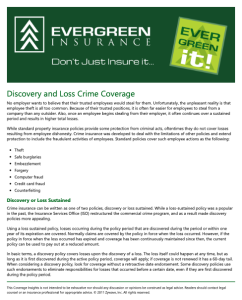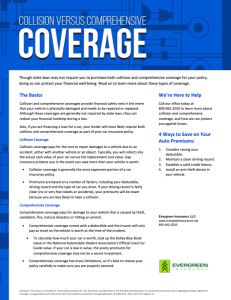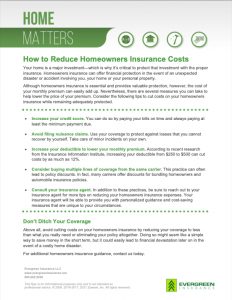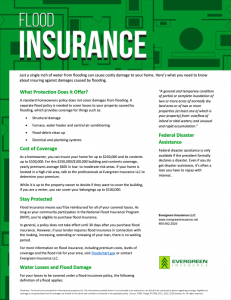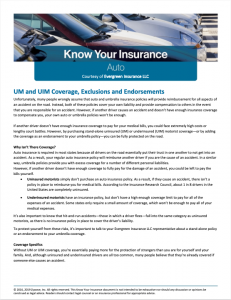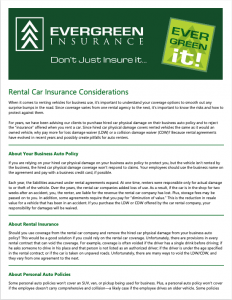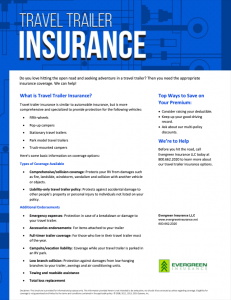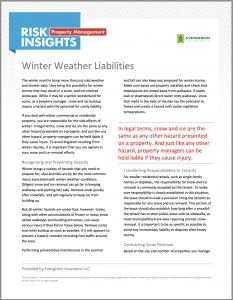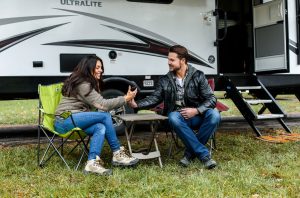Seasonal Vehicles and First-Party Benefits
Issues have arisen with inoperable or seasonal vehicles where the owner dropped the insurance for the summer/winter but failed to surrender the tag to PennDOT, keeping the registration in effect. Pennsylvania law deprives an individual from first-party benefits if that individual owns a vehicle that is registered and not insured, even if that person is injured in another vehicle that is properly insured. This issue has been adjudicated on several occasions and with one most recent (Progressive v. Kennedy) further defining the extent of the exclusion. It seems that many vehicle owners are unaware of this provision of the law and are unwittingly jeopardizing their first-party benefits.
Section 1714 of the PA Motor Vehicle Code provides that keeping a registered vehicle without insurance prevents the owner from being able to claim first-party benefits, even if he is injured in a vehicle that carries insurance (see below).
§ 1714. Ineligible claimants.
An owner of a currently registered motor vehicle who does not have financial responsibility or an operator or occupant of a recreational vehicle not intended for highway use, motorcycle, motordriven cycle, motorized pedalcycle or like type vehicle required to be registered under this title cannot recover first party benefits.
This provision is meant to ensure that “one may not receive medical and wage loss benefits unless he has the ability to provide them to another.” While the law’s intent is commendable, its application raises huge concerns for individuals who have innocently kept the tag on an inoperable or seasonal vehicle and have cancelled coverage for the duration of the repair or the off-season.
The seasonal registration of vehicles as provided for in 75 P.S. § 1307 (see below) can address some of the issues raised by this provision.
§ 1307. Period of registration.
(a.1) Seasonal registration.– Upon application on a form prescribed by the department, the owner or lessee of a passenger car, recreational motor vehicle, motorcycle, truck or farm vehicle which does not have a gross vehicle weight rating of more than 10,000 pounds may register the vehicle with the department for a period of successive months of less than one year. The applicant shall specify the period of months during which the vehicle shall be registered. Except when the department initially converts a currently valid annual registration to a seasonal registration, the annual fee prescribed for the vehicle by Chapter 19 (relating to fees) shall be paid in full by the applicant regardless of the number of months chosen for registration by the applicant. Upon receipt of the appropriate fee and the properly completed form, including all information required by this chapter, the department shall issue a seasonal registration that shall expire on the last day of the expiration month chosen by the registrant. No insurer of a vehicle belonging to any owner or lessee who obtains a seasonal registration and who applies for or receives a reduced automobile insurance premium on account thereof shall be required to provide any contractual coverage, whether in the form of the provision of a defense or the payment of first-party or third-party benefits or otherwise, to the owner or lessee in connection with any event occurring during that part of the year in which the vehicle is not registered; and such owner or lessee shall be treated for all purposes, including, without limitation, ascertaining rights to stack coverages and to uninsured and underinsured motorist coverage, as a person who does not own that vehicle and has no duty to carry financial responsibility on it for that part of the year. (emphasis added)
However, PennDOT has indicated that this section is greatly misused, with the majority of applications incorrectly filed, leaving many individuals in violation of title 75, and also with a serious gap in coverage. To make matters worse, they usually find out when it is too late.
So, what should you do?
If you want to cancel coverage on a vehicle because
- it is inoperable or under restoration, OR
- it is used on a seasonal basis, OR
- it is used occasionally (such as a classic, collectible or antique car)
Be cautioned: if you do not handle your registration properly with PennDOT, not only will you be in violation of the registration statute – and face consequences on that end, but they might lose first-party benefits on all their other insured vehicles.
What options do you have in order to maintain first-party benefits at all times?
OPTION 1: You must send the tag back to PennDOT immediately. This will suspend the registration and ensure that the owner is compliant with Title 75. To return the license plate, fill out form and send it to Bureau of Motor Vehicles, Return Tag Unit, P.O. Box 68597, Harrisburg, PA 17106-8597. Form MV-141 will be stamped by PennDOT upon receipt and returned to the sender, thus evidencing receipt. As an alternative, you may return the tag directly to any PennDOT agent. Please be aware that the agent will charge an additional fee for this service.
OPTION 2: You can choose to maintain insurance on the vehicle. It is, after all, a very simple solution. If it is possible, you may be content with reducing their liability limits to the minimum legal requirement on that vehicle only in order to reduce the premium.
OPTION 3: If, and only if, you qualify, you may apply to PennDOT for seasonal registration. If properly handled, the individual will be able to drop Financial Responsibility during the off-season. However, due care and diligence in choosing the new expiration date for the registration is of utmost importance. You should be clear as to when the registration ceases and make sure the FR matches that date. The vehicle must never be operated during the off-season.
Section 1307 will protect:
- the insurer, who will not have to pay any claim during the “off season” (when the vehicle is considered not registered), and
- the owner, because it will maintain his first-party benefits whole.
Again, bear in mind that the majority of seasonal registration applications are incorrectly filed. Seasonal registration is more likely to be applicable when you are dealing with recreational vehicles, motorcycles, or trucks or farm vehicles with a gross weight not exceeding 9,000 pounds. It is not applicable to antique, classic and collectible vehicles, or vehicles that are inoperable or under repair/restoration. To read PennDOT’s Fact Sheet about seasonal registration, click here. To apply for seasonal registration, click here.
Bottom line: It is crucial for owners of seasonal vehicles to be aware of this provision of the law.
© 2021 Insurance Agents & Brokers. Used with permission. This document is not a legal opinion and should not be relied upon as such. The intent of this document is to provide general information regarding specific situations and specific questions with respect to the topic or topics covered in this document. Neither the Insurance Agents & Brokers nor any of its employees shall be responsible for any errors or omissions regarding any statements made in this document, nor any errors or omissions regarding any statutes, regulations, court rules, and/or any other government documents cited in this document.
